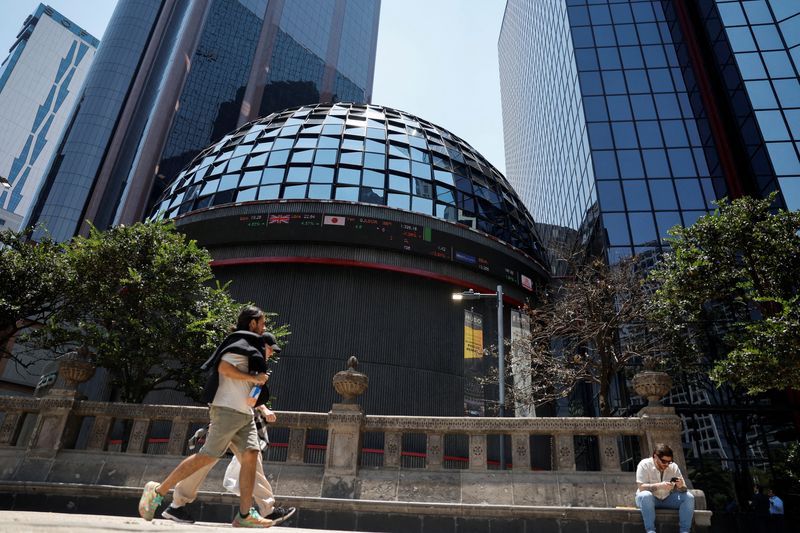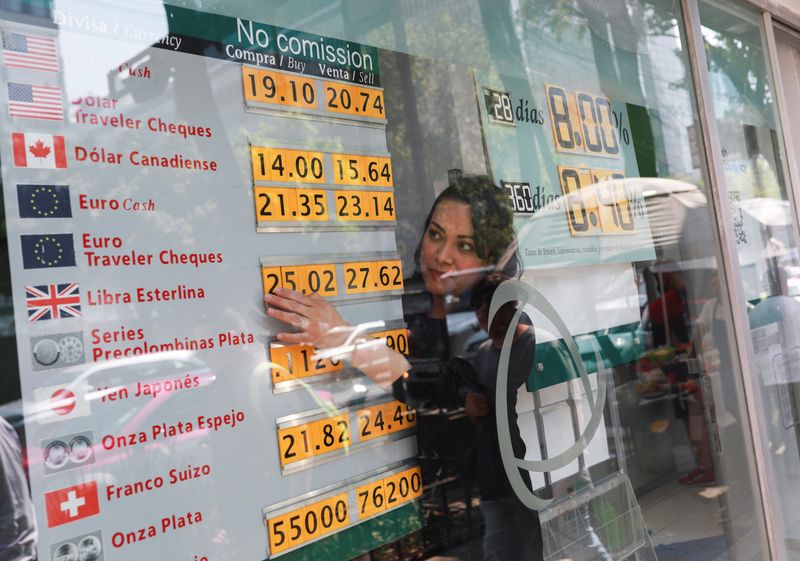By Karin Strohecker, Noe Torres and Rodrigo Campos
LONDON/MEXICO CITY/NEW YORK (Reuters) -Mexico's peso was narrowly weaker on Wednesday after largely recovering from a slump earlier in the day to its lowest level in more than two years, as analysts said the slide in response to Donald Trump's U.S. election victory was overdone.
While the U.S. election extended a streak of volatility and weakness for emerging markets, Mexico was seen as particularly vulnerable given its exposure to the U.S. economy, its biggest export market.
The peso weakened 0.4% at 1436 ET, trading at 20.2048 per dollar, after dropping in early trading as low as 20.8100 per dollar for the first time since August 2022, a fall some analysts said may have been overdone.
"I think some of it was priced in the currency already, though there’s big domestic factors impacting (the peso) as well," said Shamaila Khan, head of fixed income for emerging markets and Asia Pacific at UBS Asset Management.
"Volatility could be both ways, because when you have super majority, there are a lot of good things the government can do as well," Khan added, referring to the political strength of the country's ruling Morena coalition.
Emerging market currencies have shown mixed behavior against a soaring dollar, with the Brazilian real gaining over 1% and Chile's peso chalking up the biggest losses in Latin America.
The Mexican peso has shed over 18% of its value so far this year against the U.S. dollar, posting sharp setbacks after Mexico's election in the summer roiled domestic assets.
Rodolfo Ramos, head of Mexico research at Brazilian bank Bradesco, said a Trump administration was not an unknown and this was now "an attractive entry point" for investors.
"Mexico has already worked with him successfully," he said in a note to clients. "We see uncertainty on tariffs in the short term, but we remain positive on nearshoring over the medium and long run."
After Trump's 2016 presidential victory, the peso plummeted around 8.5% against the dollar to a then-historic low.
While markets evaluate the effects of trade barriers Trump has threatened, Mexican President Claudia Sheinbaum tried to play down concerns about a drastic rupture.
FUTURE CONCERNS
Still, Chris Turner, global head of markets at ING, said he would not rule out a move to 22.00 pesos to the dollar over the coming weeks.
He added that 2025 could be a "rough year for the peso" ahead of the USMCA trade pact review in 2026.
Citi's Luis Costa said in a note to clients that the Wall Street bank had put on a short position of the Mexican peso vs the South African rand, expecting the Latin American currency to weaken in that pairing.
Immigration from Mexico to the U.S. as well as remittances are expected to be other flash points under a Trump presidency.
Investors should also watch out for possible central bank interventions in emerging markets, said Costa. Banxico said it could intervene in the case of highly dysfunctional markets.

Mexico's currency is one of top five worst performing emerging market currencies in 2024, much of that weakening since Sheinbaum's landslide victory in June.
Sheinbaum is set to present her first budget on Nov. 15. Citi economists expect a 5% deficit for 2025.
